How the Second Circuit took the air out of Judge Berman’s attempt to vacate the long-standing deference standard for arbitration decisions
by Martin J. Greenberg and Lori Shaw
I. Introduction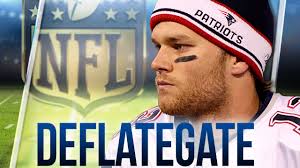
During the 2015 AFC Championship game, which the Patriots went on to win, Colts linebacker D’Qwell Jackson (“Jackson”) intercepted Brady.[1] Jackson returned to the sideline with the football and gave it to Colts equipment personnel, who noticed that the football was softer and felt flatter than usual, which for a cold night in New England was rather odd as the football should have been harder to catch if anything.[2] After Jackson returned to the sideline with the intercepted football, the allegations began to swirl on the internet. A story broke during the game by Indianapolis Star reporter Bob Kravitz (“Kravitz”) stating that “the NFL may be investigating the Patriots for possibly deflating the footballs.”[3] As the days went on, more and more information leaked.
II. Timetable
What follows is a brief synopsis of the timeline of Deflategate:[4]
- January 18, 2015: AFC Championship game between the Colts and Patriots. After halftime, the referees replaced the original twelve footballs from the first half with twelve back up footballs after questions were raised concerning whether the footballs were regulation or not;
- January 19, 2015: Kravitz, of the Indianapolis Star, reported that the Patriots were under investigation by the NFL for underinflating the footballs used in the AFC Championship game;
- January 20, 2015: ESPN reports that out of the twelve footballs used in the first half of the AFC Championship game, 11 were “significantly underinflated;”
- January 23, 2015: Both Patriots Head Coach Belichick and Brady denied any participation in the deflated footballs. The NFL reported that they had begun an investigation into the underinflated footballs and the investigation was headed by Ted Wells (“Wells”);
- January 26, 2015: FoxSports reported that a Patriots’ locker room attendant was seen taking two bags of game footballs into the bathroom and then leaving a minute and a half later; Patriots arrive in Arizona for Superbowl XLIX; Wells states that an investigation will take several weeks to complete;
- February 1, 2015: Patriots win the Superbowl;
- February 3, 2015: NFL Executive Vice President of Football Operations Troy Vincent stated in an interview that it was Colts General Manager Ryan Grigson who informed the NFL during the AFC Championship game that the footballs were underinflated;
- May 6, 2015: The NFL released the Wells Report. The Wells Report stated that “the NFL found it ‘more probable than not’ that Patriots personnel deliberately deflated footballs during the AFC Championship Game, and that Brady was probably ‘at least generally aware’ of the rules violations.” The Wells report was supported by evidence such as text messages between an equipment assistant and locker room manager. In the text messages, Brady was implicated as being aware of the underinflated footballs. Brady refused to turn over personal emails, texts, and phone records. But, from the records provided by the equipment assistant, the Wells Report “found an increase in the frequency of phone calls and texts between Brady and the equipment assistant shortly after suspicions of tampering went public”’
- May 11, 2015: Brady is suspended for four games by the NFL. The Patriots are fined $1 million and forfeited two draft picks (the first, a first round pick in the 2016 draft and the second, a fourth round pick in the 2017 draft);
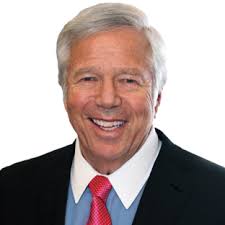 May 15, 2015: Brady and the NFL Players Association (“NFLPA”) appeal the four game suspension. The NFLPA requested NFL Commissioner Roger Goodell to remove himself as arbitrator under the CBA;
May 15, 2015: Brady and the NFL Players Association (“NFLPA”) appeal the four game suspension. The NFLPA requested NFL Commissioner Roger Goodell to remove himself as arbitrator under the CBA;- May 19, 2015: Patriots owner Robert Kraft (“Kraft”) announces he will accept the NFL’s prescribed punishment;
- May 22, 2015: The NFL denies the request made by the NFLPA to remove Goodell as arbitrator;
- June 2, 2015: Goodell sends a letter to the NFLPA officially informing them that he will not recuse himself. “In a letter to the union, Goodell cited his responsibility under the labor agreement to ‘serve as hearing officer in any appeal involving conduct detrimental to the integrity of the game;’”
- June 23, 2015: Brady’s appeal begins in New York and lasts ten hours;
- June 28, 2015: “The NFL announce[d] Brady’s four-game suspension will not be reduced;”
- July 29, 2015: The NFLPA, on Brady’s behalf, appeals Goodell’s arbitration decision to federal court.[5]
- September 3, 2015: U.S. District Judge Richard M. Berman said Goodell went too far in affirming the punishment of Brady, thereby erasing the quarterback’s four-game suspension;
- October 26, 2015: NFL appeals the District Court’s decision that overturned Goodell’s arbitration decision;[6]
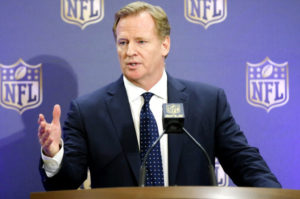 November 23, 2015: Brady’s appeal will be heard on March 3, 2016 announces a federal appeals court in New York;
November 23, 2015: Brady’s appeal will be heard on March 3, 2016 announces a federal appeals court in New York;- March 3, 2016: One of the appeals judges, Judge Denny Chin, “said evidence of ball tampering was ‘compelling, if not overwhelming;”
- April 25, 2016: U.S. Court of Appeals overturns District Court decision and reinstates Brady’s four game suspension;
- May 23, 2016: Brady files for a second appeal in the Second Circuit;
- July 13, 2016: The Second Circuit denies Brady’s request for an appeal;[7]
- July 15, 2016: Brady announces he will not appeal his four game suspension to the Supreme Court.[8]
III. Discussion
The controversy surrounding Deflategate has raised several important issues in the NFL, but none more important than the Commissioner’s power to divvy out punishments and act as arbitrator under Article 46 of the current NFL Collective Bargaining Agreement (“CBA”). Under the current CBA, the Commissioner has the power to issue fines or suspensions to players for conduct that occurs both on and off the field.[9] Specifically, the Commissioner can issue fines or punishments, like suspensions, for actions that occur on the football field as well as off the football field that he deems to be “conduct detrimental to the integrity of, or public confidence in, the game of professional football.”[10] After the Commissioner has properly notified the player, and the NFLPA, of the discipline, the player, together with the NFLPA, has the ability to appeal the Commissioner’s punishment.[11] If the player chooses to appeal the Commissioner’s decision, “the Commissioner shall . . . appoint one or more designees to serve as hearing officers.”[12] The designee(s) whom the Commissioner appoints will then issue a decision as soon as practicable; this decision is to “constitute full, final, and complete disposition of the dispute and will be binding upon the player(s), Club(s) and the parties to this Agreement with respect to that dispute.”[13]
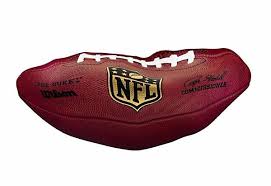 In other words, the Commissioner has the authority to discipline players for their conduct that he finds could be damaging to the reputation of the NFL, whether the conduct occurred while on the football field, or off the football field, under the provision that regulates conduct detrimental to the League. Once the Commissioner has deemed such conduct to violate the CBA, he can issue punishment as he sees fit. What is controversial is: if the Commissioner punishes a player for conduct detrimental to the League and the player appeals said punishment, the Commissioner has the authority to appoint one or more designees to hear the appeal. The only caveat to the Commissioner’s appointment power is that he must consult with the Executive Director of the NFLPA, but the Commissioner does not have to take any action that the Executive Director suggests. What is important to note here is that the Commissioner is free to appoint himself as the designee to hear the appeal of the punishment that he rendered. Or, alternatively, he is free to appoint one arbitrator suggested by the Executive Director (who is likely to vote in the players favor), one whom he appoints (who is likely to vote in favor of the League), and appoint himself as the third member of the panel and ultimately the deciding vote. But, whatever decision issued by the designee(s), under the terms of the CBA it is meant to be final and binding arbitration; the decision is to be “full, final, and [a] complete disposition of the dispute and [is] binding upon the player(s), Club(s) and the parties to this Agreement with respect to that dispute.”[14]
In other words, the Commissioner has the authority to discipline players for their conduct that he finds could be damaging to the reputation of the NFL, whether the conduct occurred while on the football field, or off the football field, under the provision that regulates conduct detrimental to the League. Once the Commissioner has deemed such conduct to violate the CBA, he can issue punishment as he sees fit. What is controversial is: if the Commissioner punishes a player for conduct detrimental to the League and the player appeals said punishment, the Commissioner has the authority to appoint one or more designees to hear the appeal. The only caveat to the Commissioner’s appointment power is that he must consult with the Executive Director of the NFLPA, but the Commissioner does not have to take any action that the Executive Director suggests. What is important to note here is that the Commissioner is free to appoint himself as the designee to hear the appeal of the punishment that he rendered. Or, alternatively, he is free to appoint one arbitrator suggested by the Executive Director (who is likely to vote in the players favor), one whom he appoints (who is likely to vote in favor of the League), and appoint himself as the third member of the panel and ultimately the deciding vote. But, whatever decision issued by the designee(s), under the terms of the CBA it is meant to be final and binding arbitration; the decision is to be “full, final, and [a] complete disposition of the dispute and [is] binding upon the player(s), Club(s) and the parties to this Agreement with respect to that dispute.”[14]
In the aftermath of the 2015 AFC Championship game, Commissioner Roger Goodell (“Commissioner Goodell”) authorized an investigation lead by Wells into whether or not the Patriots had, in fact, purposefully underinflated footballs for the AFC Championship game and who knew about the underinflation. The Wells Report was released on May 6, 2015.[15] The Wells Report found that two Patriots equipment employees, Jim McNally and John Jastremski, were responsible for the underinflation of the game balls.[16] In the 243-page document, the Wells Report stated that “based on the totality of the evidence, that it is more probable than not that Brady was at least generally aware of the inappropriate activities of McNally and Jastremski involving the release of air from Patriots game balls.”[17] Although the Wells Report stated that it was “more probable than not that Brady was at least generally aware” of the deflated footballs, there was no evidence that Brady told McNally to remove air pressure from the footballs.[18] There was also no evidence that McNally actually released any air from the footballs, except for a text message that came to light where he called himself “The Deflator.” In fact, many scientists have stated that due to the temperature during the AFC Championship Game and nature in general the footballs could have slightly deflated on their own.[19] Regardless, Commissioner Goodell suspended Brady for the first four games of the 2015 NFL season for his part in the Deflategate Scandal.[20] Commissioner Goodell also fined the Patriots organization $1 million and took away multiple draft picks.[21]
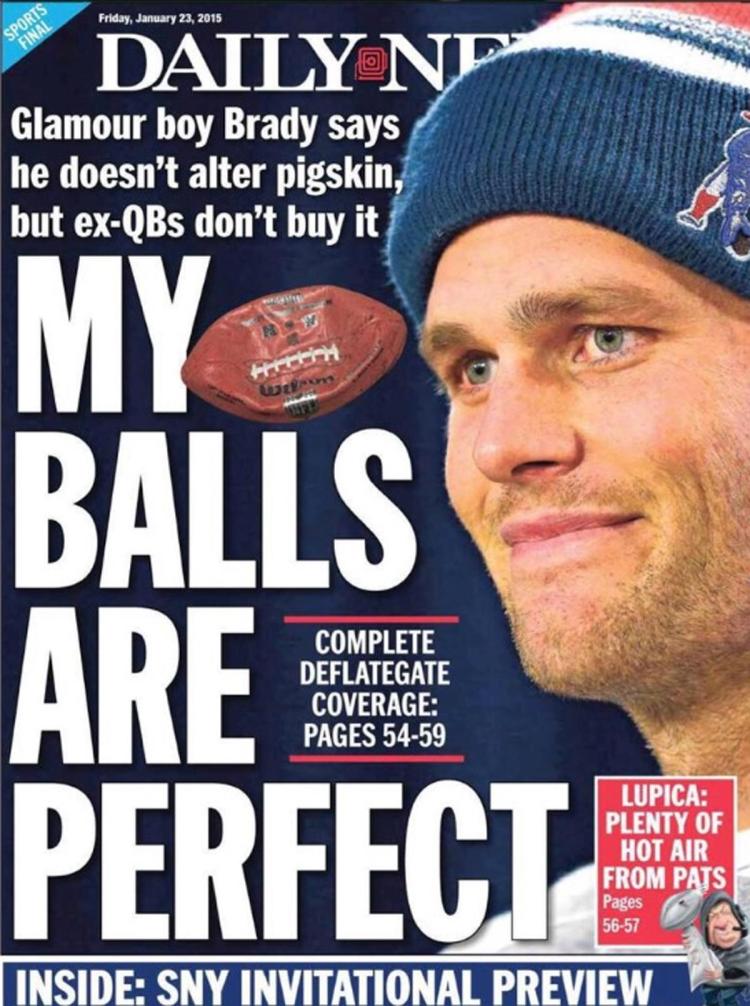 Under the terms of the CBA, before Brady could bring his appeal of the suspension to federal court, he “must exhaust his internal NFL appeals before a judge would be willing to consider the case.”[22] Brady, as expected, appealed the suspension handed down by Commissioner Goodell to the NFL.[23] Also, as expected, Commissioner Goodell heard Brady’s appeal—even though the NFLPA requested that he recuse himself from the appeal.[24] Brady’s hearing lasted just ten hours.[25] One week later, the NFL and Commissioner Goodell upheld Brady’s four game suspension.[26] Brady, and the NFLPA, thereafter appealed to federal court to have Commissioner Goodell’s decision vacated.[27]
Under the terms of the CBA, before Brady could bring his appeal of the suspension to federal court, he “must exhaust his internal NFL appeals before a judge would be willing to consider the case.”[22] Brady, as expected, appealed the suspension handed down by Commissioner Goodell to the NFL.[23] Also, as expected, Commissioner Goodell heard Brady’s appeal—even though the NFLPA requested that he recuse himself from the appeal.[24] Brady’s hearing lasted just ten hours.[25] One week later, the NFL and Commissioner Goodell upheld Brady’s four game suspension.[26] Brady, and the NFLPA, thereafter appealed to federal court to have Commissioner Goodell’s decision vacated.[27]
U.S. District Court Judge Richard Berman heard Brady’s appeal of Commissioner Goodell’s suspension.[28] While Brady has the right to appeal his arbitration decision to court after exhausting the internal appeals process, the standard of review for arbitration decisions is extremely deferential. Unless the arbitrator acted with bias, corruption, or fraud, or exceeded his authority under the terms of the CBA, courts will generally uphold the arbitrator’s decision and judges are not to overturn the arbitrator’s decision simply because they do not like how the arbitrator came to such decision.[29] Meaning judges should not conduct their own review of the evidence and overturn the arbitrator’s decision simply because they believe the result should have been different. Courts are more deferential to arbitration decisions due to the fact that the parties agreed to arbitration in lieu of utilizing a court to settle the dispute under the CBA; the CBA that was jointly agreed upon and approved by all parties. However, Judge Berman was not as deferential to the arbitration as most believed he should be. Instead, “Judge Berman surprised many observers by demonstrating significant curiosity in the underlying evidence relating to Brady and slightly under-inflated footballs.”[30] Many were surprised by his curiosity because in a court review of an arbitration award, “Judge Berman’s role [wa]s to review an arbitration award, not to conduct a trial. In such a review, judges are expected to accord high deference to the arbitrator’s findings of facts.”[31] Instead, Judge Berman seemed to be conducting his own investigation into the facts of the case and whether Brady participated in any way, so much so that the “NFL indirectly reminded Judge Berman that his interest in the facts could be misplaced.”[32] The NFL went on to reiterate to the court, specifically Judge Berman, “that Goodell’s factual conclusions about Brady ‘may not be disturbed’ under federal law. . . . stress[ing] that an arbitrator’s factual findings are accorded ‘extreme deference’ under the law, [and] that Judge Berman should only explore questions about evidence with the highest form of reverence for Goodell’s fact-finding.”[33] What that means is that “whatever concerns Judge Berman may have about the lack of direct evidence linking Brady to a ball deflation scheme should not be grounds for the [J]udge to overrule Goodell.”[34]
Although the NFL reiterated to Judge Berman that arbitration decisions are awarded extreme deference, whether the judge likes the outcome or not, Judge Berman seemed more concerned with whether Brady, in fact, personally had any involvement in the Deflategate scandal rather than whether Article 46 of the CBA was correctly applied.[35] He went on to vacate the four game suspension in September 2015.[36] In his decision, Judge Berman noted “that Brady’s arbitration lacked fundamental fairness because he was denied the opportunity to examine Jeff Pash, the NFL’s general counsel and co-lead investigator, while being denied access to the files in the investigation conducted by [Ted] Wells.”[37] Judge Berman went on to state in his decision that “the Court concludes that, as a matter of law, no NFL policy or precedent notifies players that they may be disciplined (much less suspended) for general awareness of misconduct by others. And, it does not appear that the NFL has ever, prior to this case, sought to punish players for such an alleged violation.”[38] Ultimately, Judge Berman concluded that Brady’s hearing “was fundamentally unfair and in violation of 9 U.S.C. § 10(a)(3) and that Brady was prejudiced as a result.”[39] What Judge Berman’s decision did was potentially set new precedent for how arbitration decisions issued by league commissioners are dealt with. Judge Berman’s decision ultimately could have meant that no longer would courts blindly defer to Commissioner-decided arbitration decisions. However, the NFL quickly filed an appeal with the Second Circuit in order to squash the potentially precedent-setting decision of Judge Berman.
The NFL appealed Judge Berman’s decision on October 26, 2015.[40] In the Second Circuit’s review of Judge Berman’s decision, the Court had to determine “whether Berman correctly applied the law in either vacating or confirming the award.”[41] In correctly applying the law, the Court looked at whether or not Judge Berman “went above and beyond his powers to come to his opinion.”[42] In their review, the three judge panel reversed Judge Berman’s decision, reinstating Brady’s four game suspension imposed by Commissioner Goodell.[43] The Second Circuit stated, “We hold that (NFL Commissioner Roger Goodell) properly exercised his broad discretion under the [C]ollective [B]argaining [A]greement and that his procedural rulings were properly grounded in that agreement and did not deprive Brady of fundamental fairness.”[44] After reversing the District Court’s decision, the case was sent back to Judge Berman with orders to affirm the suspension.[45] Judge Barrington Parker, who wrote the Second Circuit’s opinion, stated that “even if an arbitrator makes mistakes of fact or law, [the court] may not disturb an award so long as [the arbitrator] acted within the bounds of his bargained-for authority.”[46] In other words, “Judge Parker said it wasn’t the Court’s role to determine whether or not Brady engaged in the intentional deflation of the footballs, or whether the penalty was too harsh.”[47] In his decision, Judge Parker reiterates that
the parties contracted in the CBA to specifically allow the Commissioner to sit as the arbitrator in all disputes brought pursuant to Article 46, Section 1(a)[.] . . . They did so knowing full well that the Commissioner had the sole power of determining what constitutes ‘conduct detrimental,’ and thus knowing that the Commissioner would have a stake both in the underlying discipline and in every arbitration brought pursuant to Section 1(a). Had the parties wished to restrict the Commissioner’s authority, they could have fashioned a different agreement.[48]
What the Second Circuit’s decision does is to reaffirm the long-standing, and industry-accepted, practice that when parties have agreed through the collective bargaining process to resolve disputes in final and binding arbitration, it is not for the court to intervene and rule on the facts of the dispute. The CBA gives the arbitrator the power and authority to decide the dispute under the terms of the agreement.
Brady and the NFLPA filed for a second appeal with the Second Circuit in May 2016.[49] The second appeal requested a hearing en banc, meaning that of the thirteen judges on the Court of Appeals, seven judges would have to agree to the rehearing.[50] However, the Second Circuit denied the second appeal, simply stating: “IT IS HEREBY ORDERED that the petition is denied.”[51] The Second Circuit gave no further explanation for their denial of the rehearing.
After more than 545 days,[52] the Deflategate scandal is still not over. In comparison, Watergate consumed the nation’s attention for 783 days.[53] And while Deflategate continues to wage on, so does the amount spent to fight this battle over air pressure between the NFL, the NFLPA, Brady, and the Patriots. Thus far, approximately $22.5 million has been spent in legal fees alone.[54] While Brady has given up the fight against the NFL, stating that he will not appeal his suspension to the United States Supreme Court,[55] the NFLPA and Patriots’ owner Kraft have not stepped out of the ring quite yet. The NFLPA has stated that they “will continue to review all of our options and we reserve our right to petition for cert[iorari] to the Supreme Court.”[56] The NFLPA’s decision to petition the Supreme Court to hear the Deflategate appeal or not begins and ends with the CBA; the NFLPA could get a definitive answer regarding the legality of the Commissioner’s discipline power or could gain the upper hand going into future CBA negotiations.[57] Throughout the investigation and court proceedings, Kraft has adamantly stood behind his quarterback. “From day one, I have believed in Tom and given him my unwavering support in his pursuit to rightfully clear his name of any wrongdoing.”[58] However, his support of the NFL and the Second Circuit’s decision to deny Brady’s rehearing is not as strong. After the Second Circuit’s decision, Kraft stated, “[t]he penalty imposed by the NFL was unprecedented, unjust and unreasonable, especially given that no empirical or direct evidence of any kind showed Tom did anything to violate League rules prior to, during or after the 2015 AFC Championship Game.”[59] Kraft went on to say that “what Tom has had to endure throughout this 18-month ordeal has been, in my opinion, as far removed from due process as you could ever expect in this country.”[60]
Until the NFLPA decides whether or not to petition the Supreme Court for certiorari, the Deflategate saga continues. But for now, there are a few key takeaways from Deflategate going forward.
IV. Lessons to be Learned
First, it is extremely difficult to overturn an arbitration decision. As stated above, courts will, in most instances, defer to the arbitrators’ decisions and uphold the award issued by the arbitrator. “Even when [the arbitration decisions a]re manifestly abusive, swear at the law and are based on rules of evidence that wouldn’t pass muster in a rural traffic court,” courts will still give “incredible deference” to these arbitration awards.[61] Only when an arbitrator has acted with fraud, bias, or corruption or has exceeded the authority given to the arbitrator under the terms of the agreement will a court overturn an arbitration decision. With the Second Circuit’s ruling, the same standard of review continues to apply to league commissioners who act as arbitrators and issue punishments, whether or not the court agrees with the extent of the punishment or not.
Second, Article 46 of the CBA, aptly called the Commissioner Discipline clause,[62] grants to Commissioner Goodell the right to be judge, jury, and executioner.[63] Article 46 allows Commissioner Goodell to divvy out punishments and fines for conduct he personally feels could damage the NFL’s reputation as “conduct detrimental” to the NFL, whether this conduct occurs on the field or off, and regardless of whether there is a written rule putting the players on notice before issuing the punishments. This means that Commissioner Goodell basically has the power to make up rules on the fly and issue punishments whenever he wants. “If the commissioner wants to make up the rules as he goes along, change the grounds for punishment months after issuing discipline, and manipulate the system so that despite no legal training he can serve as an arbitrator to preside over a grievance over one of his own rulings[–]The commissioner can do that.”[64] There is no player conduct rule in the current CBA that specifically puts a player, like Brady, on notice that the player may be punished for the actions of team equipment personnel. But, regardless of this fact, Commissioner Goodell has the power under Article 46 to punish players and teams for such actions that he deems “conduct detrimental,” which encompasses the actions of other individuals.[65] And the Second Circuit, in affirming Brady’s suspension and Commissioner Goodells’ punishment, gave Commissioner Goodell “in writing . . . the ability to punish anyone, for any reason, even with limited or downright false evidence, whenever he so desires.”[66]
Third, and perhaps most importantly, the current CBA expires after the 2020 season in 2021.[67] What the NFLPA failed to protect against in 2011 was the power granted to the Commissioner in Article 46[68] (as the players were likely more concerned with getting back on the field and ending the lockout than with challenging the NFL and Commissioner’s discipline power clause). Essentially, Article 46 creates “a powerful commissioner with arbitrary power over player behavior [and] is entirely in the interest of the league and its franchise owners, and against the interest of players who may fall under his thumb.”[69] Although this Article has been around since the initial CBA in 1968, no other Commissioner has relished such authority like Commissioner Goodell.[70] And because Article 46 has not been utilized by previous commissioners like it has by Commissioner Goodell, Article 46 was not limited in the 2011 CBA negotiations. Article 46, while minute in length compared to the rest of the CBA, grants the Commissioner overarching and broad authority to punish players for actions they did not know were punishable and to act as sole arbitrator over appeals to his decisions. Brady’s appeals sought to overturn his suspension; the NFLPA’s appeals sought to challenge the legality of Article 46 and the Commissioner’s authority prior to the expiration of the current CBA.[71] When the NFL and the NFLPA meet again, likely in 2020 through 2021, to discuss the new CBA, the NFLPA should (and most likely will) seek to limit this totalitarian power granted to the Commissioner by the CBA. What the NFLPA might press for going forward is a neutral, third-party arbitrator to hear disputes between players and the NFL and Commissioner. Only when there is a neutral arbitrator, unlike Commissioner Goodell, will the players’ appeals be fairly and impartially heard and justice brought to the NFL dispute process.
And lastly, Commissioner Goodell’s actions have called into question not Brady’s character (as he will be remembered as one of the greatest quarterbacks of all-time, even with this blemish on his Wikipedia page), but many have called into question Commissioner Goodell’s reputation and the competency of the Commissioner’s office. Many commentators have noted that from the outset of his tenure as Commissioner, Commissioner Goodell has acted with dictatorial reign over the NFL,[72] wielding unlimited power as was seen through his use of Article 46 in not just the Deflategate saga, but also in dealing with the Ray Rice, Greg Hardy, and Adrian Peterson to name a few. These same commentators have noted that “a commissioner who was fit for the job would have ended Deflategate within a week,”[73] but instead, Deflategate was given a catchy, newsworthy nickname and lasted over 545 days, with the timeline still progressing as we wait on the NFLPA to petition the Supreme Court or drop the case.[74] Commissioner Goodell’s use of Article 46 as a show of power has been called misguided, as “real power is not the martinet ability to hit a player with a draconian suspension. Real power is the political capital to gets [sic] deals done on things the owners have publicly said they want,” like, for example, concussion protocols and testing that extends down to Pop Warner football programs.[75] But instead, many believe that “Goodell has no capital. He has no leverage or strength. He spent it all on petty abuses.”[76] Commissioner Goodell always dreamed of becoming the NFL Commissioner,[77] but because of his abuse of Article 46, some have said that he will now go down “as the worst commissioner in the history of the league.”[78]
V. Rule Updates
Although Deflategate stopped being about footballs a long time ago, the NFL has implemented new procedures to protect against any future football tampering. At issue in Deflategate is Rule 2, Section 1 and 2 of the NFL Rulebook. When Deflategate occurred, Rule 2, Section 1 stated that “the ball shall be made up of an inflated (12 ½ to 13 ½ pounds) . . . [and] the balls shall remain under the supervision of the Referee until they are delivered to the ball attendant just prior to the start of the game.”[79] Rule 2, Section 2 stated that “each team will make 12 primary balls available for testing by the Referee . . . [and] the home team will also make 12 backup balls available for testing in all stadiums.”[80] Although Brady did not violate any NFL rule, the Patriots allegedly “violated how and when the game balls were inspected by referee Walt Anderson,”[81] giving Commission Goodell the power to punish the Patriots.
Going forward, Rule 2, Section 2 “requires all teams in all games to give 12 primary balls and 12 backup balls to the referee no later than 2 hours and 30 minutes before kickoff.”[82] These new procedures also require both halftime and after the game PSI testing and the footballs will be guarded by NFL personnel to reduce any fear of future tampering.[83]
VI. Moving on from Deflategate
Since announcing on Facebook that he would not continue appealing his four-game suspension, Tom Brady has been relatively quiet on the subject of Deflategate. But during Patriots training camp, Tom Brady finally admitted his decision not to appeal his suspension further was “personal.”[84] Simply put, Brady said “I’ve tried to move on from it. I try to just . . . focus on the positive, being here with my teammates and getting better. You don’t want to go out and do anything but try to be a great example for your teammates. We’ve got a lot of competitive guys that have been out here on the practice field and I think that’s where the focus needs to be.”[85] In other words, it seems as though Brady is simply focusing on the upcoming season, without any further distractions.
Although Brady and his teammates are ready to put Deflategate behind them and look to the season, other NFL personnel are left with a bitter taste in their mouths going forward, specifically other NFL team owners. One commentator noted that while many view Commissioner Goodell as a man “America loves to hate,” his job security is even more secure going forward, although Kraft, the Patriots, and the New England faithful might like to see him go.[86] This same commentator noted that if Kraft lead a rebellion to oust Goodell as Commissioner, he would be the sole member of the NFL owners club behind him.[87] He said this because of the way the Patriots, specifically Kraft and Brady, acted in the aftermath of Deflategate and being issued punishments and penalties by Commissioner Goodell.[88] He noted, “[i]t’s O.K. to appeal a league decision, but to engage in a lengthy all-out assault against the league and its personnel is just not how it’s done in the executive lodge. And when the Patriots basically trashed league counsel/executive vice president of labor Jeff Pash repeatedly, the Krafts were on their own. Pash generated a lot of goodwill around league circles with his long service, spearheading the labor strategy that yielded the new CBA. [And as a result,] his public flogging did not go over well.”[89] Because the NFL owners agreed to the legal standard used and the NFL rules, and the way the Patriots conducted themselves throughout Deflategate did not gain support throughout the NFL owners club, instead leading many owners to support the NFL and Commissioner Goodell going forward.
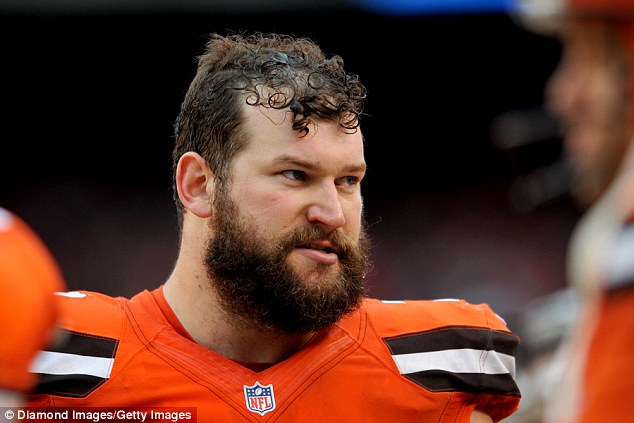 Still yet, some NFL players believed Brady should continue his fight as a symbol for players going forward as a stand against arbitrary commissioner discipline power. Joe Thomas, Cleveland Browns left tackle, has been supportive of Brady’s appeals and challenges from the beginning, equating what Brady did to driving one mile over the speed limit and “getting the death penalty.”[90] When Brady announced he would no longer be going forward with his appeals, Thomas “was disappointed the he didn’t keep appealing, from a player’s standpoint. [It] kind of gives the Commissioner a little bit more power that maybe was not necessarily already negotiated or settled.”[91] Thomas also noted that while many thought Deflategate cast a negative shadow over the NFL, he thought “what [Brady]’s doing is brilliant because he’s made the NFL relevant 365 [days] by having these outrageous, ridiculous witch hunts. It’s made the game more popular than ever and it’s become so much more of an entertainment business and it’s making so much money.”[92] So while many (and in fact, most) felt that Deflategate lasted too long and cast only negative shadows over the NFL, at least one found the silver-lining to this continuing saga.
Still yet, some NFL players believed Brady should continue his fight as a symbol for players going forward as a stand against arbitrary commissioner discipline power. Joe Thomas, Cleveland Browns left tackle, has been supportive of Brady’s appeals and challenges from the beginning, equating what Brady did to driving one mile over the speed limit and “getting the death penalty.”[90] When Brady announced he would no longer be going forward with his appeals, Thomas “was disappointed the he didn’t keep appealing, from a player’s standpoint. [It] kind of gives the Commissioner a little bit more power that maybe was not necessarily already negotiated or settled.”[91] Thomas also noted that while many thought Deflategate cast a negative shadow over the NFL, he thought “what [Brady]’s doing is brilliant because he’s made the NFL relevant 365 [days] by having these outrageous, ridiculous witch hunts. It’s made the game more popular than ever and it’s become so much more of an entertainment business and it’s making so much money.”[92] So while many (and in fact, most) felt that Deflategate lasted too long and cast only negative shadows over the NFL, at least one found the silver-lining to this continuing saga.
Lori Shaw is a graduate of Marquette University Law School where she focused on Intellectual Property and Sports Law. Shaw was also the Managing Editor for the Marquette Intellectual Property Law Review and member of the Alternative Dispute Resolution Society and Labor and Employment Law Society at Marquette. Shaw was also a double-major in History and Political Science, with a Psychology minor, at Indiana University in Bloomington, Indiana.
[1] Deflategate Timeline: After 544 Days, Tom Brady Gives In, ESPN (Jul 15, 2016), http://espn.go.com/blog/new-england-patriots/post/_/id/4782561/timeline-of-events-for-deflategate-tom-brady.
[2] Darin Gantt, Deflated Ball Investigation Began After Colts Interception, ProFootballTalk (Jan. 20, 2015), http://profootballtalk.nbcsports.com/2015/01/20/deflated-ball-investigation-began-after-colts-interception/.
[3] Jill Martin & Steve Almasy, NFL Deflategate: Brady Timeline, CNN (May 12, 2015), http://www.cnn.com/2015/05/09/us/nfl-deflategate-timeline/index.html.
[4] For more information on the full timeline and details of the Deflategate scandal, see Timeline of Events for Deflategate, Tom Brady, ESPN (July 13, 2016), http://espn.go.com/blog/new-england-patriots/post/_/id/4782561/timeline-of-events-for-deflategate-tom-brady.
[5] Louis Bien, Tom Brady Will Challenge NFL in Federal Court over DeflateGate Suspension, SBNation (July 29, 2015), http://www.sbnation.com/2015/7/28/9060673/tom-brady-suspension-appeal-federal-court-roger-goodell.
[6] Rachel Axon, Arguments for Deflategate Appeal on Tom Brady Set for March, USA Today (Nov. 23, 2015), http://www.usatoday.com/story/sports/nfl/2015/11/23/appeals-arguments-in-tom-brady-penalty-appeal-set-for-march/76286164/.
[7] Deflategate Timeline, supra note 1.
[8] Tom Brady Won’t Appeal Suspension to Supreme Court, ESPN (July 15, 2016), http://www.espn.com/nfl/story/_/id/17083595/tom-brady-new-england-patriots-appeal-suspension-supreme-court?ex_cid=espnapi_public; Tom Brady, Facebook (July 15, 2016), https://www.facebook.com/TomBrady/.
[9] NFL Collective Bargaining Agreement art. 46 § 1(a) (2011).
[10] Id.
[11] Id.
[12] Id. at art. 46 § 2(a).
[13] Id. at art. 46 § 2(d).
[14] Id.
[15] Martin & Almasy, supra note 3.
[16] Axon, supra note 6.
[17] Martin & Almasy, supra note 3.
[18] Kevin Seifert, 500 Days Later, Deflategate Is Still Full of Mystery, ESPN (June 1, 2016), http://www.espn.com/nfl/story/_/id/15857262/nfl-500-days-later-deflategate-full-mystery-tom-brady-new-england-patriots.
[19] Id.
[20] NESN Staff, Report: NFL Changing How Game Balls Are Handled, Monitored After Deflategate, NESN (July 27, 2015), http://nesn.com/2015/07/report-nfl-making-game-ball-rule-changes-after-deflategate/.
[21] Id.
[22] Michael McCann, The Legal Arguments Tom Brady May Employ in his Deflategate Appeal, Sports Illustrated (June 23, 2015), http://www.si.com/nfl/2015/06/22/tom-brady-roger-goodell-nfl-deflategate-appeal.
[23] Id.
[24] Don Melvin, Tom Brady’s ‘Deflategate’ Appeal Hearing Ends After 10 Hours, CNN (June 23, 2015), http://www.cnn.com/2015/06/23/us/deflategate-brady-hearing/.
[25] Id.; James Brady, Tom Brady Appeal Likely Won’t Be Decided Until Late July, per Report, SBNation (June 25, 2015), http://www.sbnation.com/nfl/2015/6/25/8845177/tom-brady-appeal-deflategate-suspension-hearing.
[26] SI Wire, NFL Upholds Patriots QB Tom Brady’s Four-Game Suspension, Sports Illustrated (July 28,2015), http://www.si.com/nfl/2015/07/28/patriots-quarterback-tom-brady-suspension-appeal-deflategate.
[27] Bien, supra note 5.
[28] Michael McCann, Breaking down Brady’s Incendiary Filing in Federal Deflategate Case, Sports Illustrated (Aug. 15, 2015), http://www.si.com/nfl/2015/08/14/tom-brady-filing-roger-goodell-deflategate-federal-case-analysis
[29] MLBPA v. Garvey, 532 US 504 (2001).
[30] McCann, supra note 28.
[31] Id.
[32] Id.
[33] Id.
[34] Id.
[35] McCann, supra note 22.
[36] Axon, supra note 6.
[37] Axon, supra note 6.
[38] Andy Rosen & John R. Ellement, Key Excerpts from Judge Berman’s Deflategate Ruling, The Boston Globe (Sept. 3, 2015), https://www.bostonglobe.com/metro/2015/09/03/key-excerpts-from-judge-berman-ruling-favor-tom-brady-his-deflategate-battle-with-nfl/otHrD9NxJsREqR2UYWW2kJ/story.html.
[39] Id.
[40] Axon, supra note 6.
[41] Rachel Axon, Why Tom Brady Could Play in Week 1 Even if He Loses DefalteGate Case, Indianapolis Star (Aug. 31, 2015), http://www.indystar.com/story/sports/nfl/2015/08/30/why-tom-brady-could-play-week-1-even-if-he-loses-deflategate-case/71428834/.
[42] Id.
[43] Lorenzo Reyes, Federal Court Has Reinstated the NFL’s Four-Game Suspension of Tom Brady, USA Today (Apr. 25, 2016), http://www.usatoday.com/story/sports/nfl/2016/04/25/tom-brady-nfl-suspension-reinstated-federal-court-deflategate/83497072/; Tom Brady’s Suspension Ordered to be Reinstated by Second Circuit, CBS Boston (Apr. 25, 2016), http://boston.cbslocal.com/2016/04/25/report-tom-bradys-suspension-reinstated-by-second-circuit/.
[44] Reyes, supra note 43.
[45] Id.
[46] Id.
[47] Id.
[48] Id.
[49] Tom Brady Asks for Second Hearing at 2nd Circuit, ESPN (May 23, 2016), http://espn.go.com/nfl/story/_/id/15674493/tom-brady-new-england-patriots-files-appeal-court-decision-upheld-four-game-suspension-deflategate.
[50] Id.
[51] Order Denying Petition, Case 15-2801 (2016), available at http://a.espncdn.com/pdf/2016/0713/BradyAppealDenied.pdf.
[52] Greg A Bedard, Blanket Coverage: Like It or Not, Roger Goodell’s Job Is Only Getting More Secure, Sports Illustrated (July 28, 2016), http://www.si.com/nfl/2016/07/28/deflategate-roger-goodell-new-england-patriots-tom-brady.
[53] Seifert, supra note 18.
[54] Id.
[55] Id.
[56] Tom Brady Won’t Appeal Suspension to Supreme Court, supra note 8.
[57] Hayden Bird, How Deflategate Could Continue Without Tom Brady, Boston.com (July 16, 2016), https://www.boston.com/sports/deflategate/2016/07/16/heres-deflategate-continue-without-tom-brady.
[58] Michael Middlehurst-Schwartz, Robert Kraft Hammers NFL After Tome Brady Gives Up On Deflategate Suspension, USA Today (July 16, 2016), http://www.usatoday.com/story/sports/nfl/patriots/2016/07/15/robert-kraft-deflategate-tom-brady-roger-goodell/87143898/.
[59] Id.
[60] Id.
[61] Michael Hilzik, Deflategate Post-Mortem: It’s the NFL Players Union’s Fault for Giving Roger Goodell So Much Power, L.A. Times (Apr. 26, 2016), http://www.latimes.com/business/hiltzik/la-fi-hiltzik-deflategate-20160426-snap-htmlstory.html.
[62] Melissa Jacobs, Week Under Review: Lessons Learned with Deflategate Mercifully Over, Sports Illustrated (July 16, 2016), http://www.si.com/nfl/2016/07/16/deflategate-lessons-tom-brady-roger-goodell-patriots.
[63] Chad Finn, Some Final Thoughts on the Key Players in Deflategate, Boston Globe (July 20, 2016), http://www.boston.com/sports/new-england-patriots/2016/07/20/final-thoughts-players-deflategate.
[64] Michael Hurley, The End of DeflateGate: Tom Brady’s Loss Minor Compared to Commissioner’s Ultimate Victory, CBS Boston (July 15, 2016), http://boston.cbslocal.com/2016/07/15/the-end-of-deflategate-tom-bradys-loss-minor-compared-to-commissioners-ultimate-victory/.
[65] Id.
[66] Id.
[67] Bird, supra note 57. Sally Jenkins, Why Roger Goodell, Not Tom Brady, Is Deflategate’s Real Loser, Washington Post (July 19, 2016), https://www.washingtonpost.com/sports/redskins/why-roger-goodell-not-tom-brady-is-deflategates-real-loser/2016/07/19/946c09b2-4dcc-11e6-a422-83ab49ed5e6a_story.html.
[68] Christopher L. Gasper, Defaltegate Is All About Roger Goodell’s Power, Not Brady’s Punishment, Boston Globe (Apr. 26, 2016), https://www.bostonglobe.com/sports/patriots/2016/04/26/deflategate-all-about-goodell-power-not-brady-punishment/HSvWSEfGp88C1qdq1UYKmI/story.html; Finn, supra note 63.
[69] Hilzik, supra note 61.
[70] Jacobs, supra note 62.
[71] Bird, supra note 57.
[72] Jacobs, supra note 62.
[73] Jenkins, supra note 67.
[74] Bedard, supra note 52.
[75] Jenkins, supra note 67. Bedard, supra note 52.
[76] Jenkins, supra note 67.
[77] Hurley, supra note 64.
[78] Jenkins, supra note 67.
[79] NFL Rulebook Rule 2, section 1.
[80] NFL Rulebook Rule 2, Section 2.
[81] Greg Price, Did Tom Brady Cheat? Breaking Down NFL Ball Rules in ‘Defltegate,’ Int’l Bus. Times (May 7, 2015), http://www.ibtimes.com/did-tom-brady-cheat-breaking-down-nfl-ball-rules-deflategate-1912383.
[82] Mike Florio, All Teams Must Now Give 24 Balls to the Referee for Pregame Testing, NBC Sports (July 10, 2016), http://profootballtalk.nbcsports.com/2016/07/10/all-teams-must-now-give-24-balls-to-the-referee-for-pregame-testing/.
[83] Ben Volin, NFL Finalizes New Rules for Football Inspection, Boston Globe (July 27, 2015), https://www.bostonglobe.com/sports/2015/07/26/footballs/GBfXQAzFzbqh8gCwUHADTO/story.html.
[84] Aaron Mansfield, Tom Brady Finally Addresses Deflategate Suspension, Complex (Aug. 5, 2016), http://www.complex.com/sports/2016/08/tom-brady-addresses-deflategate-suspension.
[85] Id.
[86] Bedard, supra note 52.
[87] Id.
[88] Id.
[89] Id.
[90] Tom E. Curran, Browns’ OT Thomas ‘Disappointed’ Brady Gave Up Deflategate Fight, CSNNE.com (Aug. 1, 2016), http://www.csnne.com/new-england-patriots/browns-ot-thomas-disappointed-brady-gave-deflategate-fight.
[91] Id.
[92] Id.


